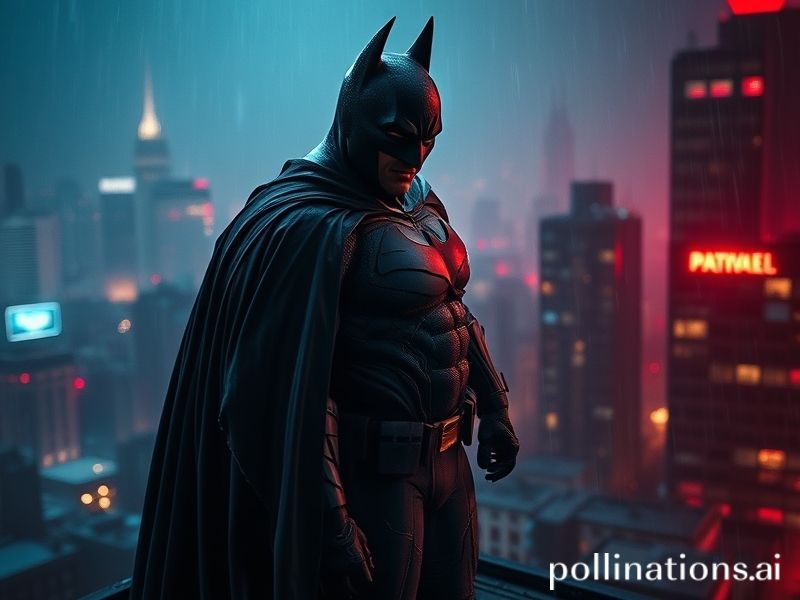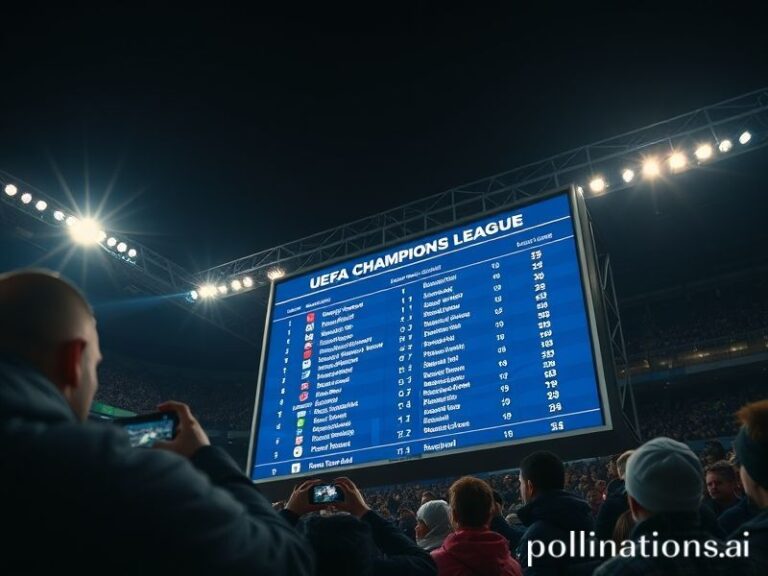Global Gotham: How ‘The Batman’ Became Every City’s Mirror and Punchline
The Batman: A Noir Valentine to a Planet That Prefers Superficial Heroes
GOTHAM—Somewhere between the fall of Kabul and the rise of gas prices that could ransom a small monarchy, the world decided what it really needed was another re-telling of the Wayne trauma-industrial complex. Enter Matt Reeves’ “The Batman,” a three-hour meditation on sulk, drizzle, and the universal truth that every city, from Caracas to Kyiv, already looks like Gotham if you squint hard enough and disable the streetlights.
Reeves’ version is pointedly not your uncle’s spandex circus. Gone is the billionaire cosplayer who merely bruises the poor; this Batman bruises himself first, staggering through sewers and moral ambiguity like a hung-over philosophy major who’s just discovered Nietzsche and fentanyl in the same week. The international press has, predictably, split along ideological lines: French critics hailed the film as “existential ballet with corrective lenses,” while Chinese censors trimmed seven minutes, presumably any scene suggesting that surveillance tech might occasionally be misused by, say, a guy in a cape with infinite money.
The plot, such as it is, revolves around riddles, corruption, and a mayoral race so dirty it could be confused with an average Tuesday in São Paulo. The Riddler, rebranded as a Twitch-streaming incel with a manifesto and a Patreon, weaponizes Google Maps and class resentment in equal measure. In other words, he’s any disgruntled data analyst you’ve ever fired, only with better production values. Watching him dox Gotham’s 1 % from an abandoned orphanage hits differently if you’re reading headlines about the Pandora Papers between popcorn bites.
Meanwhile, Catwoman—whose day job appears to be “moral flexibility consultant”—delivers the film’s most honest line: “The rich don’t care who they step on.” It’s a thesis statement sturdy enough to travel. Swap the Batmobile for a tuk-tuk and Wayne Manor for a Lagos penthouse and the story still scans. Corruption, after all, is the world’s most reliable import-export; Batman just happens to wear the local jersey.
Critics from Mumbai to Mexico City have noted the curious timing: a movie about systemic rot lands just as every global institution—from the UN to your neighborhood HOA—resembles a crime scene with better catering. The film’s color palette is the same bruised violet you see in satellite photos of wildfire smoke, and its score feels composed by someone who’s read the IPCC report and decided minor chords are the only honest response left.
And yet, for all its continental gloom, “The Batman” is weirdly optimistic. The finale—no spoilers, relax—suggests that saving a city might require something more radical than punching individual psychopaths in the face. Like, for instance, showing up to a flooded arena with an actual can-do attitude and a flashlight. International audiences, many of whom have recent firsthand experience with rising seawater and collapsing infrastructure, reportedly laughed at the notion. Then they cried. Then they bought another ticket, because irony is the last luxury good that hasn’t been tariffed.
Box-office returns confirm the film’s planetary resonance. It opened bigger in South Korea than any previous DC outing, perhaps because Seoul already lives in perpetual neon rain. In Brazil, where militia-controlled favelas mirror Gotham’s neglected back alleys, bootleg DVDs arrived before the official premiere—an efficiency even Batman’s logistics division might envy.
What lingers is the film’s tacit admission that every culture eventually writes its own vigilante myth when institutions fail. Whether that hero wears a cape, a headscarf, or a yellow vest is mere costume design; the impulse—to impose order on chaos with your own two gloved hands—is stubbornly universal. The joke, of course, is that the more we mythologize lone saviors, the less we fund boring things like drainage systems and kindergarten teachers. But hey, who needs functioning civil services when you have mood lighting and a Zimmer-lite soundtrack?
In the end, Reeves delivers a Batman for the late-capitalist end times: exhausted, underpaid (emotionally speaking), and operating under the quaint belief that evidence still matters. He’s less a superhero than the world’s most heavily armed auditor, and that, dear reader, may be the darkest joke of all. Because if Batman’s spreadsheet doesn’t balance, the rest of us are just one blackout away from living the sequel.







